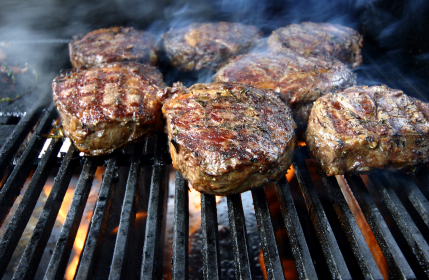
Do you like your steak well done? If so you may be increasing your risk of pancreatic and colon cancer. According to a nine year study if you eat a large quantity of well done meat you increase your risk of pancreatic cancer by 70%. Previous studies have shown that your risk of breast cancer, colon cancer, stomach cancer and prostate cancer is increased if you eat charred red meat.
Fried, grilled and barbequed meat is toxic!
Toxic cancer causing chemicals can be formed when you fry, grill or barbeque red meat. These chemicals do not occur when you stew or roast meat. Two potentially toxic substances known as polycyclic aromatic hydrocarbons (PAHs) and heterocyclic amines (HCAs) are formed when high protein foods are cooked at high temperatures.
When you barbeque over hot coals, PAH’s are formed when fat drips onto the charcoal. They get deposited onto the meat when the flames flare up which also blackens it. Burnt toast also contains PAH’s. Scientists often use PAH to cause cancer in laboratory animals for their experiments!
Cancer researcher Professor Le Marchand says. “But before these compounds can damage DNA and act as cancer-causing agents, they need to be transformed by enzymes in the body to more active forms.”
What does this mean ?
Researchers know that charcoal broiled and burnt meats increase the Phase 1 liver detox enzyme pathways in the liver to get rid of the toxins as fast as possible. This is fine if the Phase 2 detox pathways are also working well to finish the job but many people have slow Phase 2 pathways.
The substances created by Phase 1 detox can be more toxic than the original substance and it is these that cause the damage to the cell’s DNA. Phase 1 detox itself causes a lot of free radical activity which can be damaging if the body’s own antioxidant system cannot cope.
Other substances that increase the Phase 1 detox pathways are alcohol, nicotine in cigarette smoke, paint fumes, exhaust fumes, pesticides, dioxins, phenobarbitol, sulfonamide drugs and steroids.
How to reduce the dangers
If you still want to barbecue there are a few ways to reduce the dangers. The herbs garlic, rosemary and sage help to block the formation of HCA’s and PHA’s. Marinading the meat in liquid before cooking can also help.
Suggestions from the World Cancer Research Fund UK include letting the flames die down before you barbecue, using tongs instead of a fork to turn the meat (less dripping) and precooking the meat so that it spend less time on the barbecue.
I do not advise the suggestion (from another source) to microwave the meat for a few minutes and pour off the juices before putting on the grill. Researchers have found that microwaving causes significant damage to the nutrients in the food.
Other ways of reducing your risk of cancer :
- Eat more healthily by replacing burgers and sausages with chicken or fish with vegetables. You can cook these foods in foil parcels avoiding altogether the danger of the toxic cancer causing chemicals.
- Limit your intake of nitrite-cured meats like ham, sausages, hot dogs, some cold cuts and bacon.
- Eat more foods that help to detoxify your body: broccoli, Brussels sprouts, cabbage, cauliflower, collard greens, kale, turnips, bok choy, arugula (rocket), watercress; peppers, green leafy vegetables, garlic, onions, asparagus, avocado, walnuts, tomatoes, oranges, tangerines, lemons, caraway seeds, dill seeds, pulses and whole grains.
- Eat more foods that contain antioxidants – the foods listed by the United States Department of Agriculture as having the highest levels of antioxidants are: small red beans (dried), wild blueberries, red kidney beans, pinto beans, blueberries (cultivated), cranberries, artichokes (cooked), blackberries, prunes, raspberries, strawberries, Red Delicious apples, Granny Smith apples, pecans, sweet cherries, black plums, Russet potatoes (cooked), black beans (dried), plums and Gala apples.
When there are so many toxins around us that we cannot avoid it pays to reduce the ones we do have some control over so think twice before you order a well done steak and avoid other foods that pose a cancer risk and eat plenty of fresh fruit and vegetables to help reduce your cancer risk.



